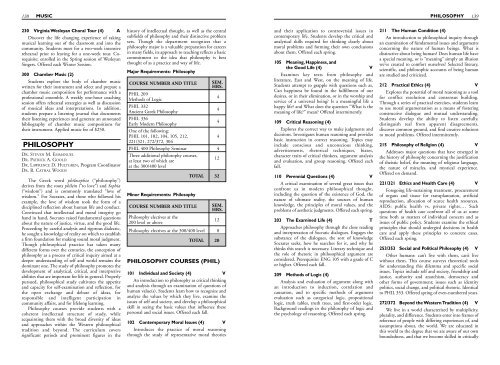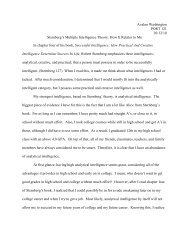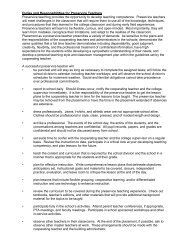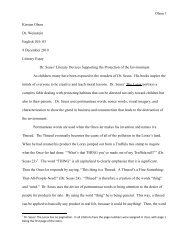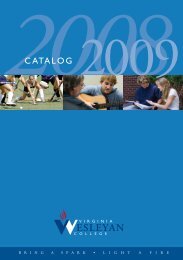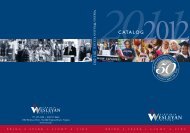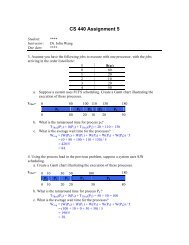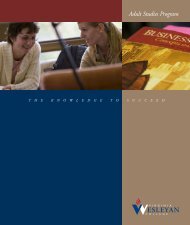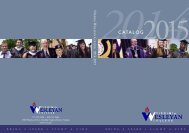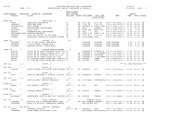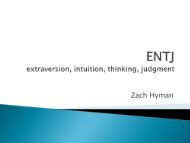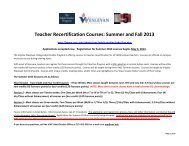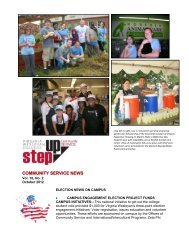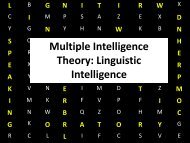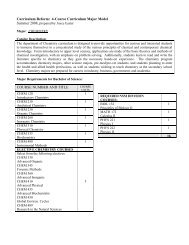136 MUSICMUSIC137102 Basic Musicianship with Guitar (4) ANo previous musical experience is necessary, butbasic fundamentals of music notation (pitch andrhythm) are taught. Students learn to make musicfrom a written score using the guitar. Students mustown their own instrument. Students may not receivecredit for MUS 102 if they have already taken MUS101. Offered fall of even-numbered years.110 A World of Music (4) AStudents listen to music as it exists in the realworld, exploring the diversity of the world’s music toacquire a sense of what exists beyond their ownexperience. Students learn about American folk,religious, jazz, popular, and ethnic music, as well assome world music. The course concludes with athorough overview of Western classical music.Offered fall of odd-numbered years.201 Music & Art in the Western World (4) AExplores the traditions of music, painting,sculpture, and architecture of the Western world.Beginning with the Greeks and continuing throughthe present, many individual works from importantart periods are introduced. Discussion topics includehow the arts reflect the sociocultural conditions oftheir time and place, how media are used, and howthe elements in each art form contribute to theaesthetic response. Identical to ARTH 201.213/313 Music History I (4) AA chronological study of music from its originsthrough the early 18th century. A research project andsome analysis are required for MUS 313.Prerequisites: MUS 100, 201, or consent. Offered fallof even-numbered years.214/314 Music History II (4) AA continuation of MUS 213/313 from the 18thcentury to the present. Prerequisite: MUS 100, 201,213/313, or consent. Offered spring of oddnumberedyears.225 Intermediate Musicianship I (4)A study of music theory, sightsinging, and eartraining as part of a program to develop completemusicianship. Music theory is the logical andsystematic study of the rationality of music thateventually justifies and broadens natural musicalinstincts and intuitions. Sightsinging and ear trainingenhance the musician’s ability to envision the soundof a musical composition from an examination of theprinted score. Includes elementary harmony andanalysis, modes, triads and inversions, melodicconstruction, and simple harmonization withprimary and secondary triads. Prerequisite: ability toread music notation. Offered fall of even-numberedyears.226 Intermediate Musicianship II (4)A study of music theory, sightsinging, and eartraining are part of a program to develop completemusicianship. Music theory is the logical andsystematic study of the rationality of music thateventually justifies and broadens natural musicalinstincts and intuitions. Sightsinging and ear trainingenhance the musician’s ability to envision the soundof a musical composition from an examination of theprinted score. Includes elementary harmony andanalysis including modes, triads and inversions,melodic construction, and simple harmonizationwith primary and secondary triads. Prerequisite:ability to read music notation and a grade of C orhigher in MUS 225. Offered spring of odd-numberedyears.250/350 Music from the Baroque Era(1600-1750) (4) AA listening course exploring music from theBaroque. Students listen to works from this period intheir entirety and discover how this music reflects thecultural history of the era. Works by Vivaldi,Couperin, Scarlatti, Handel, Bach, and others areincluded. Students have the opportunity to attendselected live performances as part of their coursework. Offered fall of even-numbered years.251/351 Music in the Classic Era(1750 to 1825) (4) AA listening course exploring music from theClassic era. Students listen to works from this periodin their entirety and discover how this music reflectsthe cultural history of the era. Works by Haydn,Mozart, Beethoven, and others are included. Studentshave the opportunity to attend selected liveperformances as part of their coursework. Offeredspring of odd-numbered years.252/352 19th-Century Music (4) AA listening course exploring music from the 19thcentury. Students listen to works from this period intheir entirety and discover how this music reflects thecultural history of the era. Works by Beethoven,Schubert, the Schumanns (both Clara and Robert),Chopin, Liszt, Verdi, Berlioz, Brahms, and others areincluded. Students have the opportunity to attendselected live performances as part of their coursework.Offered fall of odd-numbered years.253/353 20th-Century Music (4) AA listening course exploring music from the 20thcentury. Students listen to works from this period intheir entirety and discover how this music reflects thecultural history of the era. Works by Debussy, Ravel,Puccini, Bartok, Stravinsky, Schoenberg, Ives,Copland, Varèèse, Barber, Glass, Gorecki, Pärt,Zwilich, and others are included. Students have theopportunity to attend selected live performances aspart of their coursework. Offered spring of evennumberedyears.310 Topics in Sacred Music (4)An in-depth study of some aspect of sacred musicincluding, but not limited to, hymnology and sacredchoral literature, sacred music history, and choraldirecting, all within the context of a variety ofreligious traditions. Offered each semester.321 Conducting Techniques (4)Offers basic and advanced skills for choral andinstrumental conductors. Includes all conductingpatterns, instrumental and choral techniques,rehearsal technique, and score study. Prerequisite:MUS 226, APMU 111, 211, or equivalent. Offeredon demand.325 Advanced Musicianship I (4)A continuation of MUS 225 and 226. Focuses ona wide range of musical styles from the Renaissance tothe present. More complex chords and larger formssuch as the fugue, rondo, theme and variations, andsonata are studied. Various strategies for analyzingmusical compositions are investigated. Postimpressionistand serial composition techniques areincluded. Theoretical analysis and study areaccompanied by parallel exercises in sightsinging andear training. Prerequisite: MUS 226. Offered fall ofodd-numbered years.326 Advanced Musicianship II (4)A continuation of MUS 225 and 226. Focuses ona wide range of musical styles from the Renaissance tothe present. More complex chords and larger formssuch as the fugue, rondo, theme and variations, andsonata are studied. Various strategies to analyzemusical compositions are investigated. Postimpressionistand serial composition techniques areincluded. Theoretical analysis and study areaccompanied by parallel exercises in sightsinging andear training. Prerequisite: MUS 226. Offered springof even-numbered years.354 VocaI Music Methods and Materials (4)Designed for students seeking certification inmusic education, this course covers facets of vocalmusic education in Elementary, Middle and HighSchool areas. This course also serves as preparation forthe Praxis II Music Content Knowledge test.Prerequisite: MUS 321. Offered spring of evennumberedyears.480 Senior Project (2)The culminating experience in the music major.Students present a formal recital or write an historicalor critical thesis. Using music selected from eachmajor historical period, they demonstrate their abilityto apply knowledge gleaned from the study of musichistory and music theory to their interpretations orinvestigations of the chosen repertoire. Studentselecting to perform a recital take MUS 480concurrently with the final semester of applied musicstudy and receive 2 semester hours. Students writinga thesis receive 4 semester hours. Prerequisite: gradesof C or higher in MUS 313 and 325. Prerequisites/corequisites: MUS 314 and 326.APPLIED MUSIC COURSES(APMU)111 <strong>Wesleyan</strong> Singers (1) A*Offered as a cultural experience for any student ofthe college. A wide variety of choral literature isstudied and performed, occasionally accompanied bya professional orchestra. Offered each semester. *Foursemester hours must be completed to fulfill thegeneral studies requirement.113 Class Voice (2) A*Offered in conjunction with APMU 211, <strong>Virginia</strong><strong>Wesleyan</strong> Chorale. Students study basic vocaltechniques to develop the voice for both solo andchoral use. Offered each semester. *Four semesterhours must be completed to fulfill the general studiesrequirement.121-462 Applied Music: Private Study(Instrumental, Voice, Piano/OrganGuitar, and Composition) (2) A*Private applied music study is offered to studentsenrolled in the college regardless of previous musicalbackground or major interest. A serious commitmentto learning about classical music literature and thetechnique required to perform such literature isrequired. Applied music fee of $250. Prerequisite:consent. *Four semester hours must be completed tofulfill the general studies requirement.211 <strong>Virginia</strong> <strong>Wesleyan</strong> Chorale (1) A*A small performance ensemble that offers anopportunity for students to explore singing on ahigher level than is possible in a larger group of nonauditionedsingers. An audition is required. Corequisite:membership in <strong>Wesleyan</strong> Singers.Prerequisite: Instructor consent required. Offeredeach semester. *Four semester hours must becompleted to fulfill the general studies requirement.
138 MUSICPHILOSOPHY139230 <strong>Virginia</strong> <strong>Wesleyan</strong> Choral Tour (4) ADiscover the life changing experience of takingmusical learning out of the classroom and into thecommunity. Students meet for a two-week intensiverehearsal prior to leaving for a one-week tour. Corequisite:enrolled in the Spring session of <strong>Wesleyan</strong>Singers. Offered each Winter Session.300 Chamber Music (2)Students explore the body of chamber musicwritten for their instrument and select and prepare achamber music composition for performance with aprofessional ensemble. A weekly one-hour coachingsession offers rehearsal strategies as well as discussionof musical ideas and interpretations. In addition,students prepare a listening journal that documentstheir listening experiences and generate an annotatedbibliography of chamber music compositions fortheir instrument. Applied music fee of $250.PHILOSOPHYDR. STEVEN M. EMMANUELDR. PATRICK A. GOOLDDR. LAWRENCE D. HULTGREN, Program CoordinatorDR. R. CATHAL WOODSThe Greek word philosophia (“philosophy”)derives from the roots philein (“to love”) and Sophia(“wisdom”) and is commonly translated “love ofwisdom.” For Socrates, and those who followed hisexample, the love of wisdom took the form of adisciplined reflection about human life and conduct.Convinced that intellectual and moral integrity gohand in hand, Socrates raised fundamental questionsabout the nature of justice, virtue, and the good life.Proceeding by careful analysis and rigorous dialectic,he sought a knowledge of reality on which to establisha firm foundation for making sound moral judgment.Though philosophical practice has taken manydifferent forms over the centuries, the conception ofphilosophy as a process of critical inquiry aimed at adeeper understanding of self and world remains thedominant one. The study of philosophy promotes thedevelopment of analytical, critical, and interpretiveabilities that are important for life in general. Properlypursued, philosophical study cultivates the appetiteand capacity for self-examination and reflection, forthe open exchange and debate of ideas, forresponsible and intelligent participation incommunity affairs, and for lifelong learning.Philosophy courses provide students with acoherent intellectual structure of study, whileacquainting them with the broad diversity of ideasand approaches within the Western philosophicaltradition and beyond. The curriculum coverssignificant periods and prominent figures in thehistory of intellectual thought, as well as the centralsubfields of philosophy and their distinctive problemsets. Though the department recognizes that aphilosophy major is a valuable preparation for careersin many fields, its approach to teaching reflects a basiccommitment to the idea that philosophy is bestthought of as a practice and way of life.Major Requirements: PhilosophyCOURSE NUMBER AND TITLESEM.HRS.PHIL 209Methods of Logic4PHIL 332Ancient Greek Philosophy4PHIL 336Early Modern Philosophy4One of the following:PHIL 101, 102, 104, 105, 212, 4221/321, 272/372, 304PHIL 400 Philosophy Seminar 4Three additional philosophy courses,at least two of which are12at the 300/400 levelMinor Requirements: PhilosophyCOURSE NUMBER AND TITLEPhilosophy electives at the200 level or aboveTOTAL 32SEM.HRS.12Philosophy electives at the 300/400 level 8TOTAL 20PHILOSOPHY COURSES (PHIL)101 Individual and Society (4) VAn introduction to philosophy as critical thinkingand analysis through an examination of questions ofhuman value(s). Students learn how to recognize andanalyze the values by which they live, examine theissues of self and society, and develop a philosophicalskill in seeing the basic values that influence thesepersonal and social issues. Offered each fall.102 Contemporary Moral Issues (4) VIntroduces the practice of moral reasoningthrough the study of representative moral theoriesand their application to controversial issues incontemporary life. Students develop the critical andanalytical skills required for thinking clearly aboutmoral problems and forming their own conclusionsabout them. Offered each spring.105 Meaning, Happiness, andthe Good Life (4)VExamines key texts from philosophy andliterature, East and West, on the meaning of life.Students attempt to grapple with questions such as,Can happiness be found in the fulfillment of ourdesires, or in their elimination, or in the worship andservice of a universal being? Is a meaningful life ahappy life? and What does the question “What is themeaning of life?” mean? Offered intermittently.109 Critical Reasoning (4)Explores the correct way to make judgments anddecisions. Investigates human reasoning and providesbasic instruction in correct reasoning. Topics mayinclude conscious and unconscious thinking,advertisements, rhetorical techniques, biases,character traits of critical thinkers, argument analysisand evaluation, and group reasoning. Offered eachfall.110 Perennial Questions (4) VA critical examination of several great issues thatconfront us in modern philosophical thought,including the question of the existence of God, thenature of ultimate reality, the sources of humanknowledge, the principles of moral values, and theproblems of aesthetic judgments. Offered each spring.203 The Examined Life (4) TApproaches philosophy through the close readingand interpretation of Socratic dialogues. Engages thesubstance of the dialogues, the sort of knowledgeSocrates seeks, how he searches for it, and why hethinks this search is necessary. Literary technique andthe role of rhetoric in philosophical argument areconsidered. Prerequisite: ENG 105 with a grade of Cor higher. Offered each fall.209 Methods of Logic (4)Analysis and evaluation of argument along withan introduction to induction, correlation andcausation, and to specific methods of argumentevaluation such as categorical logic, propositionallogic, truth tables, truth trees, and first-order logic.Background readings in the philosophy of logic andthe psychology of reasoning. Offered each spring.211 The Human Condition (4)An introduction to philosophical inquiry throughan examination of fundamental issues and argumentsconcerning the nature of human beings. What isdistinctive about being human? Does human life havea special meaning, or is “meaning” simply an illusionwe’ve created to comfort ourselves? Selected literary,scientific, and philosophic accounts of being humanare studied and criticized.212 Practical Ethics (4) VExplores the potential of moral reasoning as a toolfor conflict resolution and consensus building.Through a series of practical exercises, students learnto use moral argumentation as a means of fosteringconstructive dialogue and mutual understanding.Students develop the ability to listen carefully,distinguish real from apparent disagreements,discover common ground, and find creative solutionsto moral problems. Offered intermittently.215 Philosophy of Religion (4) VAddresses major questions that have emerged inthe history of philosophy concerning the justificationof theistic belief, the meaning of religious language,the nature of miracles, and mystical experience.Offered on demand.221/321 Ethics and Health Care (4) VForegoing life-sustaining treatment, procurementof organs and tissue for transplantation, artificialreproduction, allocation of scarce health resources,AIDS: public health vs. private rights.… Suchquestions of health care confront all of us at sometime both as matters of individual concern and asissues of public policy. Students examine the ethicalprinciples that should undergird decisions in healthcare and apply these principles to concrete cases.Offered each spring.253/353 Social and Political Philosophy (4) VOther humans: can’t live with them, can’t livewithout them. This course surveys theoretical toolsfor understanding this dilemma and specific socialissues. Topics include self and society, friendship andjustice, authority and anarchism, democracy andother forms of government; issues such as identitypolitics, social change, and political rhetoric. Identicalto PHIL 353. Offered spring of even-numbered years.272/372 Beyond the Western Tradition (4) VWe live in a world characterized by multiplicity,plurality, and difference. Students enter into frames ofreference of people with differing experiences of, andassumptions about, the world. We are educated inthis world to the degree that we are aware of our ownboundedness, and that we become skilled in critically


